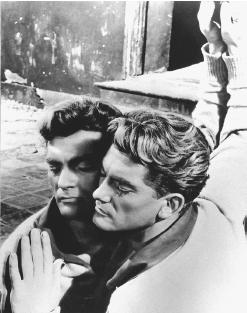
Orpheus (1950)
Cocteau's classic Orpheus is an "allegorical film" that retells the legend of Orpheus in a more contemporary setting.

"Orphee (Marais) is a successful Parisian poet, who -- despite popular acclaim -- feels isolated and uninspired. When his wife Eurydice (Dea) is striken down by leather-clad bikers, he pursues them into the underworld where he falls into a romantic entaglement with the dark-haired beauty Death (Casares). Stunning cinematography and surrealist flairs punctuate this beautiful, hypnotic masterpiece."

If you are familiar with this particular story, then be prepared for some Cocteau-magic (variously-related). As per usual with Cocteau, his surrealistic out-pouring of shadowly-dressed cinematic-language really speaks volumes for this film, as dazzling and delightful as it is, and no other director can so inextricably intertwine such familiar-bizarrities of our everyday discourse into a mind-bending turn-of-expression that harmoniously drives you into wanting so much more like Cocteau could, and did, and will - exhibitions of dashing surprises, fantasiacal-expressionism and the usual rattling of positioning you directly into the story itself.
Unfortunately, I've yet to see the other two films of this trilogy (The Blood of a Poet and The Testament of Orpheus), but soon they shall be on my viewing radar. However, Orpheus itself should really snag your hook, without an overbalanced tug, that will leave you astonished and admiring such a Triumph of artistic-brilliance.
Unfortunately, I've yet to see the other two films of this trilogy (The Blood of a Poet and The Testament of Orpheus), but soon they shall be on my viewing radar. However, Orpheus itself should really snag your hook, without an overbalanced tug, that will leave you astonished and admiring such a Triumph of artistic-brilliance.

No comments:
Post a Comment